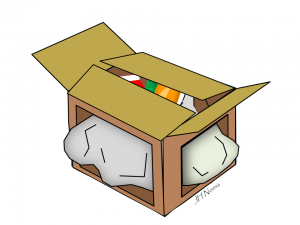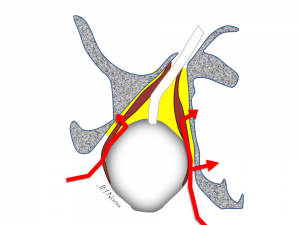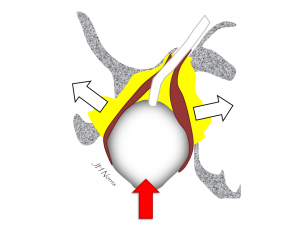This can potentially make the surface of the eye uncomfortable or cause pressure on the optic nerve that connects the eye to the brain. Decompression surgery increases the space within the eye socket to allow the eye to sit further back and to potentially reduce pressure on the nerve.
Think of the problem as a bag of shopping that won’t all fit inside a cardboard box.
If holes are made in the sides of the box the shopping will fit inside and the lid can be closed.
Instead of a cardboard box we make holes in the wall of the eye socket. This often involves inner and outer walls but may also involve the floor of the eye socket. This allows the eye to sit further back where it is protected.
The risks of surgery include bleeding, scarring and infection. We advise that you use antibiotics (as an ointment and tablet) after the surgery to help reduce the risk of infection. Some patients may experience worsening of their double vision after the surgery although this may improve after a few weeks. Numbness can also occur around the eye.
One can experience subtle vibrations in the vision (oscillopsia) when chewing food and this will often improve after a few weeks.
Serious risks include injury to major blood vessels, CSF leak and visual loss. Mr Norris will discuss these with you in clinic. Fortunately these risks are extremely rare.
The eyelids will be bruised after surgery. You will have a drain in place that will normally be removed on the first morning. You will see sutures in the upper eyelid extending to the side of the eye and these will be removed at between 1 and 2 weeks.
You should avoid any strenuous activity including lifting heavy objects for a least a week and avoid swimming for three weeks after surgery. You should also try and avoid blowing your nose for a few days.
We advise that you apply ice compresses to the eyelids after surgery for three times a day for 5 minutes each time. This is to help reduce the bruising.
We normally see you after surgery to check on the position of the eye.
It is quite normal to feel anxious after having surgery near your eyes and most problems do settle with time. Problems that require immediate attention are the onset of new double vision, loss of vision and pain that cannot be controlled with regular painkillers. In particular if the eyelid swells up and you cannot open your eye then this requires an urgent review.
Please refer to the emergency contact page (in contacts).
Author: Mr Jonathan Norris FRCOphth




